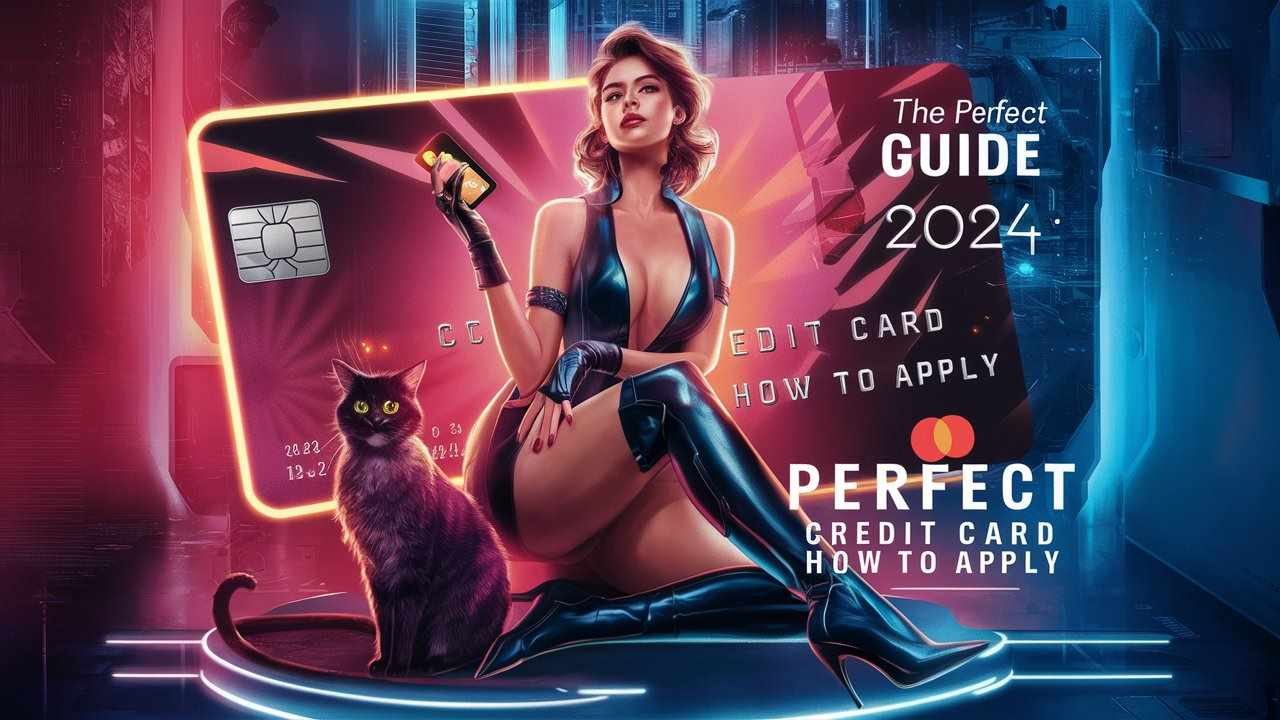Introduction to Credit Card Applications
The Evolution of Credit Card Applications: 2024 Edition
Welcome to the wild world of credit card applications in 2024! In this digital age, applying for a credit card has evolved from a tedious paper chase to a sleek online experience. The 2024 process is all about speed, technology, and personalization. Gone are the days of snail mail and endless paperwork. Today, you can apply from your couch, track your application in real-time, and even get instant approvals. As financial technology advances, credit card applications are more streamlined and user-friendly than ever before.

Why Applying for a Credit Card is a Big Deal
Applying for a credit card is not just about getting a shiny piece of plastic. It’s a pivotal step in your financial journey. Your credit card can influence your credit score, impact your spending habits, and open doors to rewards and benefits. But don’t be fooled; it’s a big deal because it requires careful thought and strategic planning. Whether you’re looking to build credit, earn rewards, or manage expenses, understanding the weight of this decision is crucial.

Understanding Credit Card Basics
What’s in a Credit Card? Breaking Down the Components
A credit card is more than just a payment tool; it’s a financial instrument packed with features. At its core, it includes a credit limit, which is the maximum amount you can borrow. There’s also an interest rate, or APR, which dictates the cost of borrowing. Additionally, credit cards often come with annual fees, rewards programs, and various perks such as cash back or travel benefits. Understanding these components helps you make an informed decision and utilize your credit card effectively.
Types of Credit Cards: From Cashback to Travel Rewards
Credit cards come in various flavors to suit different needs. Cashback cards reward you with a percentage of your purchases back, making them ideal for everyday spending. Travel rewards cards offer points or miles that can be redeemed for flights, hotel stays, and other travel expenses. Balance transfer cards help you consolidate debt by offering low or zero interest on transferred balances. Each type serves a unique purpose, so choose one that aligns with your spending habits and financial goals.

Preparing to Apply for a Credit Card
Assessing Your Credit Health: Are You Ready to Apply?
Before diving into the application pool, it’s essential to assess your credit health. This involves reviewing your credit report for accuracy, understanding your credit score, and evaluating your financial stability. A strong credit score and a clean credit history can significantly enhance your chances of approval. If your credit isn’t in top shape, consider taking steps to improve it before applying.
How to Check Your Credit Score Before Applying
Your credit score is a crucial factor in credit card applications. To check it, you can use free services offered by various financial websites or request a report from the major credit bureaus. This score provides insights into your creditworthiness and helps you gauge the types of credit cards you might qualify for. Regularly monitoring your score also allows you to spot any inaccuracies or potential issues before they impact your application.
Choosing the Right Credit Card
How to Match Credit Cards to Your Lifestyle and Needs
Choosing the right credit card is all about aligning it with your lifestyle. Are you a frequent traveler who wants airline miles? Or perhaps you prefer cash back on everyday purchases? Evaluate your spending patterns and financial goals to find a card that offers the best rewards and benefits for you. This strategic match ensures you get the most value from your credit card.
Comparing Credit Card Offers: What to Look For
When comparing credit card offers, consider several factors: the annual percentage rate (APR), fees, rewards structure, and introductory offers. Look beyond the flashy advertisements and read the fine print to understand the terms and conditions. Assess how the card’s features fit with your financial goals and spending habits to make an informed choice.

The Application Process
Step-by-Step Guide: How to Apply for a Credit Card
Applying for a credit card involves several steps. Start by selecting the card that fits your needs. Next, complete the application form, providing details such as income, employment status, and Social Security number. After submitting your application, the credit card issuer will review it and decide whether to approve or decline it. This process can be completed online or in person, depending on your preference.
Common Application Pitfalls and How to Avoid Them
Common pitfalls in credit card applications include providing inaccurate information, failing to meet income requirements, or applying for too many cards at once. To avoid these issues, double-check your application for errors, ensure you meet the card’s criteria, and apply for credit cards strategically to avoid multiple hard inquiries that could impact your score.
What Lenders Look For
Credit Card Application: The Factors Lenders Consider
Lenders evaluate several factors when reviewing a credit card application. They look at your credit score, income, credit history, and existing debt levels. They also consider your employment status and payment history. A higher credit score and stable financial situation increase your chances of approval.
How to Improve Your Chances of Approval
To boost your chances of approval, improve your credit score by paying bills on time and reducing debt. Ensure your credit report is free of errors and maintain a low credit utilization ratio. Additionally, apply for credit cards suited to your credit profile to avoid unnecessary rejections.

Filling Out the Application
Filling Out Your Credit Card Application: A How-To
Filling out a credit card application requires attention to detail. Start by entering personal information such as your name, address, and Social Security number. Provide accurate financial details, including income and employment information. Double-check all entries for accuracy to avoid delays or denials.
Understanding the Fine Print: What You’re Signing Up For
Before submitting your application, read the terms and conditions carefully. This includes understanding the interest rates, fees, rewards structure, and any promotional offers. Being aware of these details helps you make an informed decision and avoid unexpected surprises.
Submitting Your Application
Online vs. In-Person: Which Application Method is Better?
Online applications offer convenience and faster processing times, allowing you to apply from anywhere at any time. In-person applications can provide immediate assistance from a representative and are ideal if you have complex questions. Choose the method that best suits your needs and comfort level.
What Happens After You Submit Your Application?
After submission, your application undergoes review by the credit card issuer. This process may include a credit check and verification of your information. You’ll typically receive a decision within a few minutes to a few weeks, depending on the issuer and the complexity of your application.

Post-Application Process
What to Do While Waiting for Approval
While waiting for approval, monitor your email and mail for updates from the credit card issuer. Use this time to review your financial situation and prepare for responsible credit card usage. Patience is key, as processing times can vary.
How to Handle a Credit Card Application Rejection
If your application is rejected, review the reasons provided by the issuer. Common reasons include insufficient credit history or high debt levels. Address these issues by improving your credit profile and consider reapplying after a period of financial stabilization.
Credit Card Approval and Rejection
Understanding Approval Letters and What They Mean
An approval letter typically outlines your credit limit, interest rate, and other important details. Review these terms carefully to ensure they meet your expectations and needs. Understanding the terms helps you manage your credit card effectively from day one.
What to Do If Your Application is Denied
If denied, review the denial letter for specific reasons. Address any issues such as credit score or income level before reapplying. Consider seeking advice from a financial advisor or credit counselor to improve your credit profile.

Building Credit After Approval
How to Use Your New Credit Card Wisely
Once approved, use your credit card responsibly by paying bills on time and keeping your balance low. Avoid overspending and only charge what you can afford to repay. This helps build a positive credit history and avoids unnecessary debt.
Tips for Building and Maintaining Good Credit
Building good credit involves consistent, responsible use of credit. Pay your bills on time, keep your credit utilization low, and avoid applying for too many credit cards. Regularly review your credit report and score to stay on top of your credit health.
Troubleshooting Common Issues
Troubleshooting: What If Your Application Takes Too Long?
If your application takes longer than expected, contact the credit card issuer for an update. Delays could be due to missing information or additional verification requirements. Staying proactive helps resolve issues and speeds up the approval process.
How to Correct Mistakes on Your Application
If you discover mistakes on your application, contact the issuer immediately to correct them. Providing accurate information is crucial for a smooth approval process. Make any necessary corrections promptly to avoid delays or rejections.
Keeping Your Credit Card Application Secure
Avoiding Scams: How to Safeguard Your Application
To protect your application, avoid sharing personal information via unsecured channels. Use secure websites and avoid public Wi-Fi when applying online. Be wary of phishing scams and only apply through reputable sources.
What to Do If Your Personal Information is Compromised
If your personal information is compromised, report it to the credit card issuer immediately. Monitor your credit report for signs of fraud and consider placing a fraud alert or credit freeze. Taking swift action helps protect your credit and personal information.
Alternatives to Traditional Credit Card Applications
Secured Credit Cards: A Stepping Stone to Better Credit
Secured credit cards are ideal for those with limited or poor credit history. They require a security deposit that serves as your credit limit. Using a secured card responsibly can help build or rebuild your credit over time.
Credit Card Pre-Approval: What It Means and How to Get It
Pre-approval offers provide an indication of your likelihood of approval before you formally apply. These offers are based on a soft inquiry and can help you understand which
cards you might qualify for. Keep in mind that pre-approval is not a guarantee of final approval.
The Future of Credit Card Applications
Trends to Watch: What’s Next in Credit Card Applications?
The future of credit card applications includes advancements like biometric verification, AI-driven decision-making, and enhanced digital security. These innovations aim to streamline the application process and improve user experience.
How Technology is Changing the Credit Card Application Game
Technology is reshaping credit card applications with faster processing times, increased security measures, and more personalized offers. Embracing these technological advancements makes the application process more efficient and user-friendly.
Frequently Asked Questions (FAQs)
What credit card to pay first?
Prioritize paying off high-interest credit cards first to minimize the total interest you’ll pay over time. Focusing on cards with the highest APR can save you money and reduce your debt more effectively.
Is getting a credit card a good idea?
Getting a credit card can be beneficial for building credit history, earning rewards, and managing cash flow. However, it’s essential to use it responsibly to avoid debt and potential damage to your credit score.
Can I open a credit card by myself?
Yes, you can open a credit card by yourself as long as you meet the issuer’s requirements. This typically includes having a sufficient credit score, income, and a valid identification.
Can I open a credit card with poor credit?
Opening a credit card with poor credit is possible, but options may be limited to secured cards or cards designed for rebuilding credit. These cards often come with higher fees and interest rates.
What’s needed to open a credit card?
To open a credit card, you’ll need personal information such as your Social Security number, income details, and employment information. Issuers may also require a credit check to assess your creditworthiness.
What is the minimum amount to get a credit card?
There isn’t a specific minimum amount required to get a credit card, but most cards will have a minimum income requirement. Additionally, you may need to meet certain credit score criteria.
How can I get a credit card?
To get a credit card, apply online or in person with a credit card issuer. Provide the necessary personal and financial information, and wait for approval based on your creditworthiness and application details.
How to get a credit card for beginners?
For beginners, start with a credit card designed for those new to credit. Look for cards with no annual fees and lower interest rates. Make sure to use the card responsibly and pay off the balance in full each month.
How do you apply for credit?
Applying for credit involves submitting an application with personal and financial information to a lender or credit card issuer. They will review your credit history, income, and other factors before making a decision.
Is it hard to get a credit card?
The difficulty of getting a credit card depends on your credit history and financial situation. Those with good credit may find it easier to get approved, while those with poor credit may face more challenges.
Can I get a credit card online?
Yes, many credit card issuers offer online applications, making it convenient to apply from anywhere. Ensure that you are on a secure website and have all necessary information at hand when applying.
How much does it cost to open a credit card?
The cost to open a credit card can vary. Some cards have annual fees, balance transfer fees, or foreign transaction fees. Be sure to review the card’s fee structure before applying. Source
Is it good to open credit cards?
Opening credit cards can be beneficial for managing finances, building credit, and earning rewards. However, it’s important to use them wisely to avoid accumulating debt and negatively impacting your credit score.
Can I open a credit card without a bank account?
Yes, you can open a credit card without a bank account, but having one may simplify the process for managing payments. Some issuers might require a bank account for direct deposit or automatic payments.
What is a good credit score?
A good credit score typically ranges from 700 to 749. Scores in this range indicate responsible credit usage and are generally viewed favorably by lenders and credit card issuers. Source
When to get a credit card for the first time?
Consider getting a credit card when you have a stable income and can manage monthly payments responsibly. It’s also beneficial to apply when you have a good credit score or are building credit for the first time.
How to Get the Most Out of Your Credit Card Application
Maximize your credit card application experience by thoroughly understanding the process, comparing offers, and choosing the right card for your needs. Use these tips to secure the best credit card for your financial goals. Source
BOTTOM LINE
Summarizing the Perfect Credit Card Application Process
Successfully navigating the credit card application process involves careful preparation, informed decision-making, and understanding the terms. With the right approach, you can secure a credit card that aligns with your needs and goals.
Empowering Yourself with the Right Credit Card Knowledge
Equip yourself with comprehensive knowledge about credit card applications to make informed decisions and manage your credit effectively. Being well-informed empowers you to achieve your financial objectives and use credit responsibly.
Call to Action
Download Our Free Credit Card Application Checklist
Get started with our free checklist to ensure you don’t miss any crucial steps in the credit card application process. Download it now to streamline your application and secure your ideal credit card.
Subscribe for More Tips on Credit Cards and Personal Finance
Stay updated with the latest tips and advice on credit cards and personal finance by subscribing to our newsletter. Receive valuable insights and updates to help you manage your financial journey effectively.









